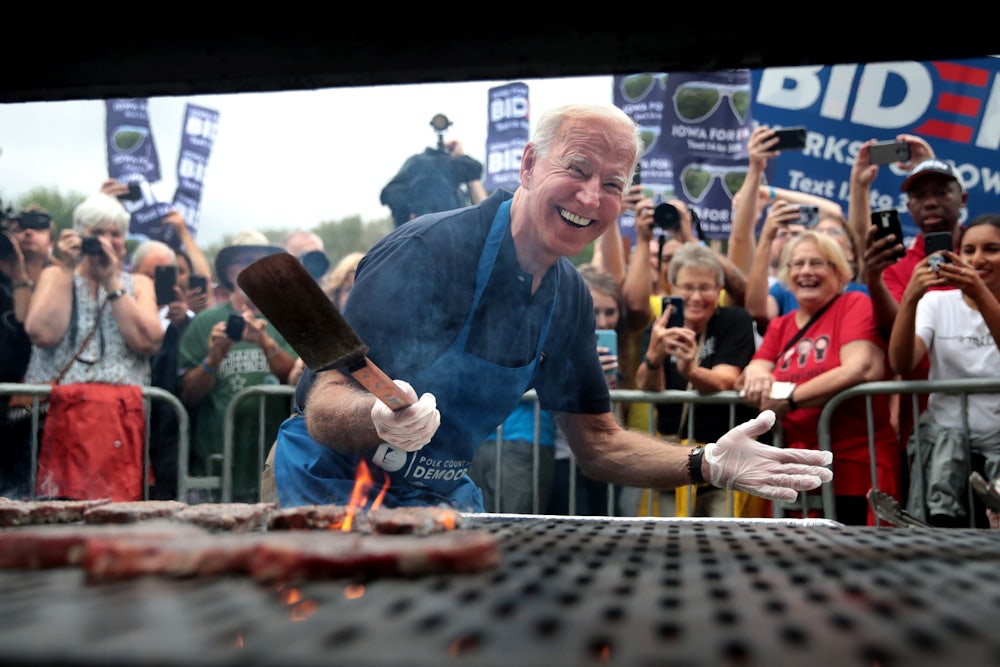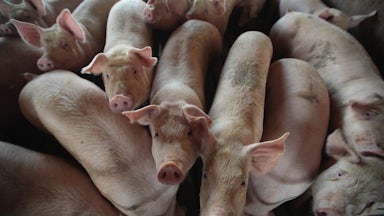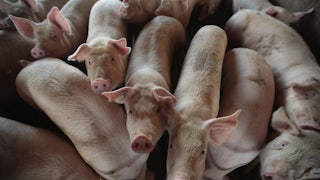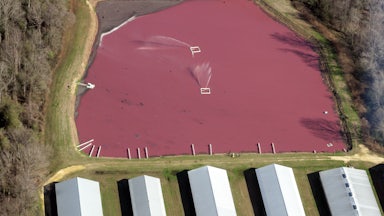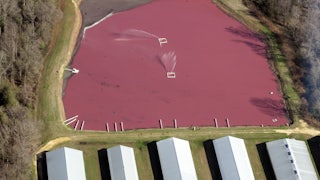Over the past few days, American conservatives have managed to wind themselves up into a full-blown meat panic. Let me try to recap.
Toward the end of last week, a Daily Mail article suggested that the Biden administration’s recent plans to reduce American emissions will include cutting the nation’s red meat consumption by 90 percent. As an unhealthy number of reactionary conservatives noted, that would amount to an allowance of roughly four pounds of meat per person each year. The story—obviously untrue to everybody who does not make their living by posting pictures of well-done steaks and bacon-wrapped asparagus on Twitter—gained traction thanks to a chorus of outrage-posts by both sitting and hopeful members of Congress, including Representative Lauren Boebert. At one low point on Friday, Fox News host Larry Kudlow misinterpreted a University of Michigan study to rave that “to meet the Biden Green New Deal targets,” Americans would have to stop eating meat completely. (There is no Biden Green New Deal, but whatever.) “No burger on July 4. No steaks on the barbie,” he said. “You can throw back a plant-based beer with your grilled Brussels sprouts and wave your American flag.”
I am almost loath to underscore this point, but none of the meat-rationing story is true, as has been pointed by numerous fact-checking publications by now. The nation’s meat consumption habits will likely not change much over the next four years. The White House has not focused on individual consumption in any of its proposals and so far seems uninterested in radically reforming the pork, poultry, or beef industries, despite spending all of last week signaling that the climate crisis is among the administration’s top priorities. Where the Department of Agriculture, Department of Labor, and Environmental Protection Agency should all be tightening the screws on labor conditions in meatpacking warehouses, runoff from hog waste lagoons, and general emissions from the industries, they are instead slapping the offenders with minuscule fines, encouraging the use of biofuels, and barely scratching the surface on implementing adequate emissions standards. Burgers, ribs, and steaks will continue to be stocked, sold, and devoured.
This kind of faux fracas over meat consumption is now occurring semi-regularly. Calls, serious or fictitious, have been issued before for Americans to eat less meat, both for health reasons and for the cumulative climate and environmental damage that industrial meat production has wrought on the planet, meatpacking workers, and neighboring communities. The most recent reminder arrived last August, when the United Nations tweeted and then deleted a post about the meat industry’s contributions to climate change. Some eight months later, we get to listen to the same song crank back up.
Here’s the truth that reliably gets buried in these uproars: We, as a nation and a society, would likely be better served if Congress and the White House did, in fact, stop subsidizing the meat production industries and created a public awareness campaign and accompanying federal program dedicated to helping people break out of our national dependency on meat. But that, unfortunately, does not make for a particularly gripping story.
Dust-ups like the one from this weekend benefit a small number of people: the conservatives hoping to gin up outrage among their followers and constituents; the fact-checkers hoping to gin up outrage among their liberal readers; and the meat industry executives looking down on the two bickering sides, smiling and comforted by the knowledge that they have nothing to worry about.
Beneath this incredibly stupid story was one of actual importance: On Friday, The New York Times reported on a recent study from the U.N., which found that high rates of methane emissions are contributing far more to the planet’s anthropogenic emissions than previously believed. Both carbon dioxide and methane emissions reached record highs last year. Methane emissions have a number of sources, including the millions of unplugged orphaned gas and oil wells littering the continent. The EPA’s most recent estimates peg methane at about 10 percent of the nation’s overall emissions; within that slice, roughly 30 percent is attributed to the gas and oil industry, while another 17 percent can be tied to landfills. But 27 percent of all U.S. methane emissions are the result of something known as enteric fermentation—a fancy way of saying pig poop and cow farts. This is where our meat-loving ways enter the fray.
Eleven years ago, a study published in Public Health Nutrition quantified America’s meat-dominated dinner tables. Since the 1960s, the per-capita rate of meat consumption in the U.S. has been nearly twice that in Europe. Even as meat consumption has risen worldwide, Americans have held fast to a comfortable lead. Two years ago, reporting on the 2017 results, the USDA found that the average American’s annual meat consumption rose to roughly 143.9 pounds.
Think about that number on an anecdotal level, if that’s easier: In the past week alone, I’ve consumed a burger, jerk chicken, pork ribs (first on their own, then grilling the leftovers with pineapple to make nachos), bacon, pancetta, fried chicken, and more. As a person who ostensibly is aware of the ill effects of said products, I continue to struggle with actually doing the work of weaning myself off meat. That’s because I personally find all of these meats delicious. But it’s also because, steaks and other expensive cuts aside, it’s pretty cheap! A pack of pork chops or a rack of ribs at the grocery store is regularly one of the best deals on the aisle, particularly if you have more than one mouth to feed.
What we need in conjunction with these perfunctory fact-checks every time a conservative hallucinates someone coming to take their burger is a deeper interrogation of why meats have become such a foundational part of American meals. This was not always the norm, for either the Indigenous communities or for the majority of working people prior to the 1970s. To revert to the anecdotal once again, over the years I have asked my dad and my aunts and uncles, all of whom grew up on a tobacco farm, how often they ate meat growing up from the 1940s to the 1970s. The answer across the board has been that cuts of beef and pork, and even chicken to an extent, were rare dinner table items because of their scarcity and relative cost. And the Public Health Nutrition study backs this up: While Americans, per capita, were already consuming more meat than the rest of the world in the 1960s, the average person was eating roughly 250 grams of meat per day, or 100 grams less per day than they did in 2007. Go back to 1909, and the average American was eating just 150 grams per day.
The human body is constantly evolving, but tripling meat consumption in just over a century is a fairly remarkable update. This sudden uptick has far less to do with personal choice and much more to do with the way that the federal government has decided to act as a crutch for corporations like Tyson, Cargill, and JBS. Were that crutch ever kicked out—by cutting some of the $38 billion in subsidies paid to dairy and meat industries and pushing for the increased presence of labor unions in the warehouses—a new future might actually be possible. But, again, this is not the tack being pursued by the White House or Congress.
The reason that not even a trace amount of nuance can be added to this conversation on a national scale is because of how devoted Americans are both to meat and to reactionary culture wars. Meat isn’t an organic protein to be devoured in moderation so much as it is a representation of American exceptionalism. Likewise, the need to fact-check every claim furthered by conservative grifters, while worthwhile in moderation, isn’t so much a useful contribution to the discourse as it is an attempt to game the SEO and soak up as many clicks as possible from the deluge of “Meat+Canceled+Biden” Google searches. Aunt Joan is not clicking your CNN link, Larry Kudlow still doesn’t know where beer comes from, and the White House is not remotely radical in its approach to climate change, meat, or almost anything else. OK? OK.
